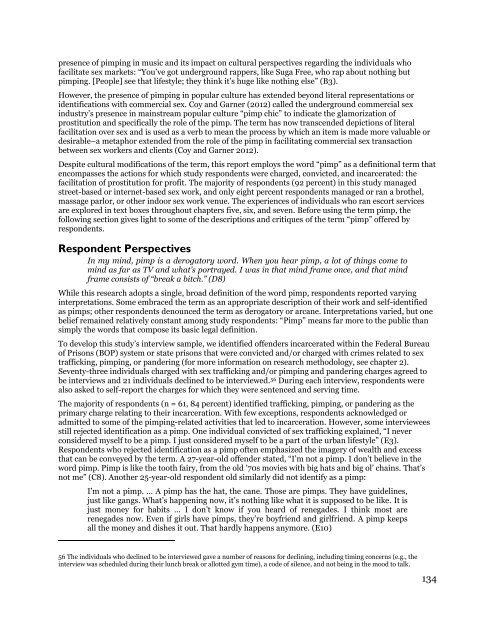413047-Underground-Commercial-Sex-Economy
413047-Underground-Commercial-Sex-Economy
413047-Underground-Commercial-Sex-Economy
You also want an ePaper? Increase the reach of your titles
YUMPU automatically turns print PDFs into web optimized ePapers that Google loves.
presence of pimping in music and its impact on cultural perspectives regarding the individuals who<br />
facilitate sex markets: “You’ve got underground rappers, like Suga Free, who rap about nothing but<br />
pimping. [People] see that lifestyle; they think it’s huge like nothing else” (B3).<br />
However, the presence of pimping in popular culture has extended beyond literal representations or<br />
identifications with commercial sex. Coy and Garner (2012) called the underground commercial sex<br />
industry’s presence in mainstream popular culture “pimp chic” to indicate the glamorization of<br />
prostitution and specifically the role of the pimp. The term has now transcended depictions of literal<br />
facilitation over sex and is used as a verb to mean the process by which an item is made more valuable or<br />
desirable–a metaphor extended from the role of the pimp in facilitating commercial sex transaction<br />
between sex workers and clients (Coy and Garner 2012).<br />
Despite cultural modifications of the term, this report employs the word “pimp” as a definitional term that<br />
encompasses the actions for which study respondents were charged, convicted, and incarcerated: the<br />
facilitation of prostitution for profit. The majority of respondents (92 percent) in this study managed<br />
street-based or internet-based sex work, and only eight percent respondents managed or ran a brothel,<br />
massage parlor, or other indoor sex work venue. The experiences of individuals who ran escort services<br />
are explored in text boxes throughout chapters five, six, and seven. Before using the term pimp, the<br />
following section gives light to some of the descriptions and critiques of the term “pimp” offered by<br />
respondents.<br />
Respondent Perspectives<br />
In my mind, pimp is a derogatory word. When you hear pimp, a lot of things come to<br />
mind as far as TV and what’s portrayed. I was in that mind frame once, and that mind<br />
frame consists of “break a bitch.” (D8)<br />
While this research adopts a single, broad definition of the word pimp, respondents reported varying<br />
interpretations. Some embraced the term as an appropriate description of their work and self-identified<br />
as pimps; other respondents denounced the term as derogatory or arcane. Interpretations varied, but one<br />
belief remained relatively constant among study respondents: “Pimp” means far more to the public than<br />
simply the words that compose its basic legal definition.<br />
To develop this study’s interview sample, we identified offenders incarcerated within the Federal Bureau<br />
of Prisons (BOP) system or state prisons that were convicted and/or charged with crimes related to sex<br />
trafficking, pimping, or pandering (for more information on research methodology, see chapter 2).<br />
Seventy-three individuals charged with sex trafficking and/or pimping and pandering charges agreed to<br />
be interviews and 21 individuals declined to be interviewed. 56 During each interview, respondents were<br />
also asked to self-report the charges for which they were sentenced and serving time.<br />
The majority of respondents (n = 61, 84 percent) identified trafficking, pimping, or pandering as the<br />
primary charge relating to their incarceration. With few exceptions, respondents acknowledged or<br />
admitted to some of the pimping-related activities that led to incarceration. However, some interviewees<br />
still rejected identification as a pimp. One individual convicted of sex trafficking explained, “I never<br />
considered myself to be a pimp. I just considered myself to be a part of the urban lifestyle” (E3).<br />
Respondents who rejected identification as a pimp often emphasized the imagery of wealth and excess<br />
that can be conveyed by the term. A 27-year-old offender stated, “I’m not a pimp. I don’t believe in the<br />
word pimp. Pimp is like the tooth fairy, from the old ’70s movies with big hats and big ol’ chains. That’s<br />
not me” (C8). Another 25-year-old respondent old similarly did not identify as a pimp:<br />
I’m not a pimp. … A pimp has the hat, the cane. Those are pimps. They have guidelines,<br />
just like gangs. What’s happening now, it’s nothing like what it is supposed to be like. It is<br />
just money for habits … I don’t know if you heard of renegades. I think most are<br />
renegades now. Even if girls have pimps, they’re boyfriend and girlfriend. A pimp keeps<br />
all the money and dishes it out. That hardly happens anymore. (E10)<br />
56 The individuals who declined to be interviewed gave a number of reasons for declining, including timing concerns (e.g., the<br />
interview was scheduled during their lunch break or allotted gym time), a code of silence, and not being in the mood to talk.<br />
134


